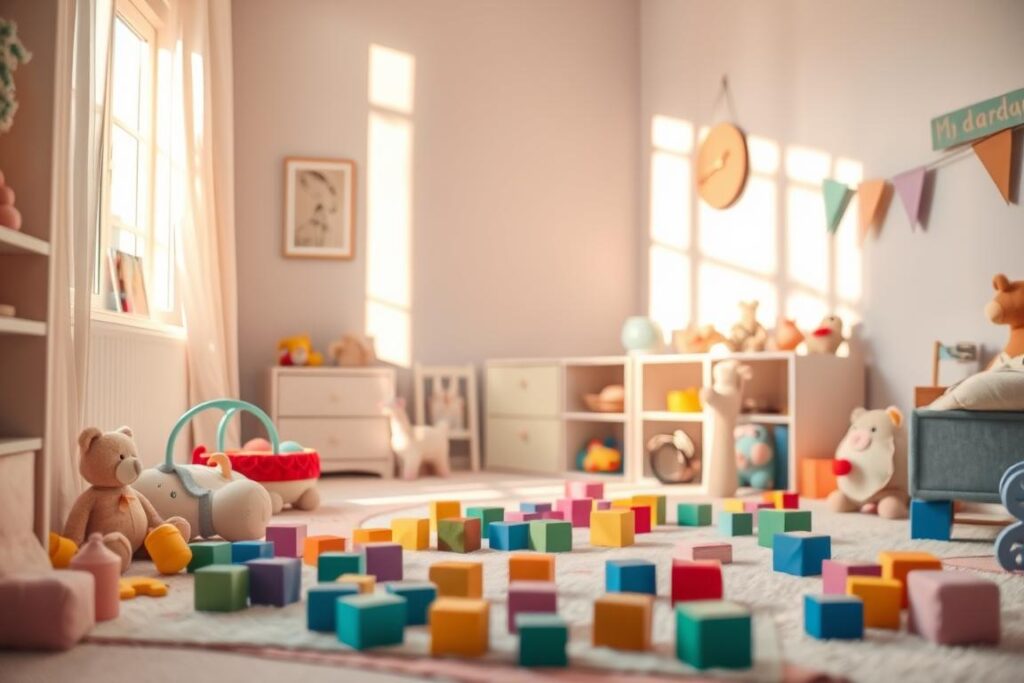As your child grows from a baby into a toddler, you might think they’ll become more independent. But sometimes, toddlers go back to baby-like behaviors. This is called “toddler regression.” It can be confusing and hard for parents to handle.
It’s important to understand why this happens. Knowing the reasons helps you support your child’s growth and development.
Key Takeaways
- Toddler regression is a common phase of child development where a toddler temporarily reverts to more baby-like behaviors.
- Regression can occur due to stress, major life changes, or as a normal part of the brain’s maturation process.
- Common regression behaviors include increased clinginess, thumb-sucking, and difficulty with potty training or sleeping.
- Parents can navigate this phase by maintaining a consistent routine, providing emotional support, and seeking professional help if necessary.
- Positive parenting strategies, such as setting appropriate boundaries and balancing independence with support, can help toddlers through regression periods.
Understanding Toddler Regression: A Common Developmental Phase
Toddler regression is a normal part of growing up. It’s key for parents to know the signs and when it happens. This helps families support their child’s growth during tough times.
Signs and Symptoms of Regressive Behavior
Toddlers might act like babies again during regression. They might cling more, throw tantrums, and have trouble sleeping or using the toilet. These behaviors are hard for parents but show a child needs extra comfort.
Age Ranges When Regression Typically Occurs
Regression often happens in toddlers aged 18-24 months and again in preschoolers around 3-4 years. But, every child grows differently, so regression can happen at various ages.
Normal vs. Concerning Regression Patterns
Most of the time, toddler regression is just a phase that passes. But, if a child’s behavior is very bad or lasts a long time, it’s time to get help. Watching how long and how bad the regression is helps figure out if it’s normal.
“Regression is a natural part of a child’s growth, and it’s important for parents to be patient and understanding during these times.”
Knowing about toddler regression helps parents meet their child’s emotional needs. It makes the tough times easier to get through.
Common Triggers That Cause Baby-Like Behavior in Toddlers
Toddlers are full of energy, always exploring their surroundings. Sometimes, they may act like babies again, surprising their parents. Knowing what causes this can help parents support their children better.
Big changes, like moving or starting daycare, can be a big stress for toddlers. These changes upset their routine and make them want to act more like babies.
- Adjusting to a new home or caregiver can be overwhelming, causing toddlers to regress to earlier developmental stages.
- The introduction of a new sibling is another common trigger, as toddlers may feel threatened by the arrival of a younger child and yearn for the attention they once received.
Changes in family dynamics can also make toddlers act younger. Events like divorce or a parent being away can make them feel insecure. They might act like babies again to feel safe.
“Toddlers often use regression as a way to cope with big changes or stressful events in their lives. By temporarily going back to more baby-like behaviors, they can feel a sense of comfort and control.”
Knowing what triggers these behaviors helps parents support their toddlers. With patience and a loving environment, children can get through these tough times and keep growing.
The Psychology Behind Your Child’s Return to Baby Behavior
When your toddler starts acting like a baby again, it can be confusing and worrying. But, this is a normal part of their growth. It’s all about their emotional and mental development.
Emotional Security and Attachment Needs
At the heart of regression is a child’s need for safety and attachment. When they feel stressed or things change, they might act more like a baby. This is their way of seeking comfort and feeling secure.
Brain Development During Regression Periods
Regression happens when a child’s brain is growing a lot. Their brain psychology and emotional development are still learning. They might act like they’re younger as their brain absorbs new things.
Stress Response in Young Children
Young kids’ attachment theory and how they handle stress are still growing. When they face big challenges, they might go back to baby-like behaviors. It’s their brain’s way of finding safety in uncertain times.
Knowing why toddlers regress can help parents be more understanding and patient. It lets them support their child as they grow and move forward.
Major Life Changes That May Spark Regression
Toddlers are very strong, but big changes can shake their world. When families go through big changes, kids might act like babies again. This is because they feel less secure.
Getting a new sibling is a big change. It makes kids feel many emotions. They might want to go back to old habits for comfort.
Divorce or moving to a new home can also upset kids. They find it hard to adjust to new places and people. Even good changes, like learning to use the potty, can make them feel unsure.
“Regression is a completely normal response to major life changes, and it’s important for parents to be patient and understanding during these transitional periods.”
It’s important to remember that acting like a baby is okay. Parents can help by being there for them. Keeping routines the same and offering support helps kids feel better.
How Parents Can Navigate Sleep Regression Episodes
Dealing with toddler sleep regressions can be tough for parents. But, with the right steps, you can help your child sleep better. Adjusting bedtime routines and handling night wakings are key. Here’s how to support your child during these tough times.
Bedtime Routine Adjustments
Keep bedtime calm and consistent during a sleep regression. Try simpler activities like reading or singing lullabies. Slowly add new things to avoid upsetting your child’s sleep.
Managing Night Wakings
Stay calm and consistent when your toddler wakes up a lot. Let them try to fall back asleep on their own. If they can’t, offer gentle help without talking too much.
Creating a Supportive Sleep Environment
Make sure your child’s sleep area is perfect for rest. It should be cool, dark, and quiet. Use white noise or blackout curtains to help them sleep better.
Handling sleep regressions takes patience and understanding. By following these tips, you can help your toddler sleep well again. This will keep their toddler sleep patterns healthy during the tough times.
Potty Training Setbacks and Solutions
Potty training is a big step for kids, but parents often face setbacks. Toilet training regression can be tough, but you can help your child get back on track.
Changes in routine or environment can cause potty training regressions. This includes new siblings, moving homes, or changes in childcare. Stress, anxiety, or needing extra attention can also lead to accidents and setbacks.
To help your child’s potty training routine, try these potty training tips:
- Keep a regular schedule and encourage bathroom trips, even if your child doesn’t want to.
- Give praise and rewards for good tries, but don’t scold or punish for accidents.
- Make the bathroom area calm and positive. Avoid pressuring your child to avoid anxiety.
- If your child feels overwhelmed, use diapers or pull-ups for a while, then go back to the potty.
- Talk to your child’s caregivers to keep everyone on the same page and consistent.
Remember, regression is normal in potty training. Stay patient, supportive, and consistent. This will help your child overcome challenges and reach this important milestone.
| Potty Training Setback | Possible Causes | Solutions |
|---|---|---|
| Reverting to diapers | – Change in routine or environment – Stress or anxiety – Seeking attention |
– Maintain a consistent schedule – Offer praise and rewards – Create a calm, positive environment |
| Frequent accidents | – Lack of bladder control – Distraction or forgetfulness – Potty refusal |
– Encourage regular bathroom breaks – Use positive reinforcement – Consider temporary use of diapers |
| Resistance to using the potty | – Fear or discomfort – Power struggles – Developmental delays |
– Make the potty experience fun – Avoid forcing the issue – Seek professional guidance if needed |
Every child is different, and the key to handling toilet training regression is patience, flexibility, and a positive approach. With the right support and strategies, you can help your child overcome these challenges and move forward confidently.
Supporting Your Child Through Regression at Daycare or Preschool
Helping your child through regression at daycare or preschool is a delicate task. It’s important to keep talking with teachers and make sure home and school are consistent. These steps are key to helping your child get through this tough time.
Communication Strategies with Teachers
Building a strong relationship with your child’s teachers is crucial. Share what you’ve noticed at home and work together to find classroom solutions. Regular talks and updates help everyone support your child together.
- Discuss your child’s specific triggers and coping mechanisms
- Coordinate consistent routines and responses between home and school
- Provide updates on any changes or progress in your child’s behavior
- Work with teachers to create a nurturing, secure environment for your child
Creating Consistency Between Home and School
Keeping things familiar and stable is vital for kids going through regression. By matching your home approach with school strategies, your child will feel more secure and supported.
- Reinforce the same calming techniques and comfort items used at school
- Collaborate with teachers to ensure a smooth transition between home and school
- Discuss and implement consistent discipline methods and positive reinforcement
- Share information about any changes or events that may trigger regression
By working together, home and school can help your child overcome regression. Open communication and a united effort are essential for your child’s success during this time.
When to Seek Professional Help for Regression
Dealing with toddler regression can be tough for parents. While some episodes are normal, others might need a professional’s help. Knowing when to ask for help can support your child through tough times.
If your child’s regressive behaviors last too long, it’s time to see a pediatrician. If these behaviors stop your child from learning or growing, it’s a sign to get a professional assessment.
- Persistent nightmares, separation anxiety, or sleep disturbances that don’t get better with support
- Regression in toilet training or self-care skills that last longer than a few weeks
- Significant changes in a child’s mood, temperament, or social interactions
- Delays in reaching developmental milestones or a regression in cognitive, language, or motor skills
When you notice these signs, a pediatric consultation with a specialist can be very helpful. They can find out why your child is regressing and help you make a treatment plan. They support both the child and the family during this time.
Getting help early can make a big difference. It ensures your child’s regression is handled right and any developmental concerns are looked into. This way, families can get through this phase with more confidence.
Positive Parenting Strategies During Regression Phases
When your toddler goes through regression, be patient and understanding. Use positive discipline to guide them. Set clear boundaries and support their independence.
Setting Appropriate Boundaries
It’s key to keep boundaries clear and consistent during regression. This gives your child a sense of security. Explain rules gently and clearly, showing your child what’s okay.
Stay calm and avoid harsh words. Harshness can make things worse.
Balancing Independence with Support
Regression is a chance to meet your child’s emotional needs. Encourage independence but also offer support. Let them make choices that fit their age.
Be there for comfort and guidance. Use emotional coaching to help them understand their feelings.











